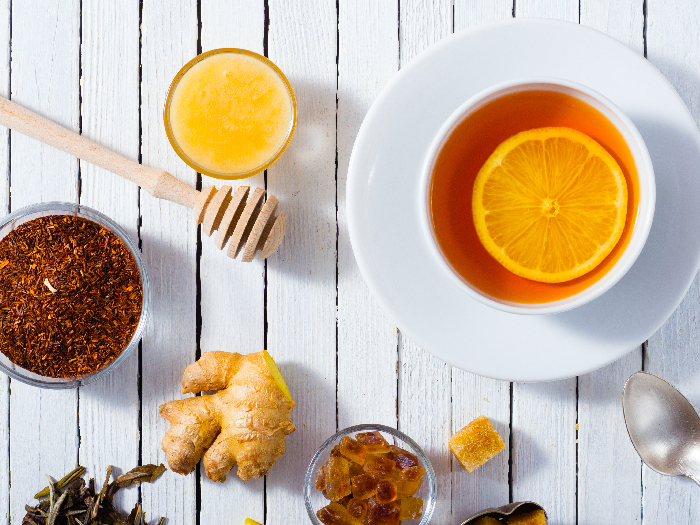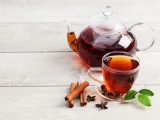If you enter a tea shop, a herbalist store, or even your local supermarket, you are likely to get dizzy seeing the options in the tea aisle. While regular teas like black and green tea are not difficult to buy, there is an entire section on caffeine-free teas or herbal teas. You may have noticed tea brands that use flowery descriptions like caffeine-free calming teas, teas for soothing anxiety, and yet another one which promises you a great night’s sleep. So what exactly are caffeine-free teas and which one is right for you? Let’s find out.
What is Caffeine-free Tea?
Caffeine-free tea or herbal tea is a beverage made by steeping roots, stems, bark, seeds, leaves, fruits, or flowers (dried or fresh) of a plant in hot water. They are naturally caffeine-free, and some examples of plants used to make it include hibiscus, peppermint, rooibos, and ginger, among others. These herbal infusions are also called tisanes. [1]
It’s no secret that the trend for good quality caffeine-free or herbal tea has exploded the world over. You can find exotic mixes in the market like sweet berries and rose, dried apple and cinnamon, spearmint mixed with turmeric and lemongrass, among others. You can even make your own caffeine-free tea with your favorite herbal ingredients. Some specialty teas may contain chocolate, which does have caffeine. So it is best to check for the label “caffeine-free” while buying.
Caffeine-free Tea Vs Decaf Tea
Traditional tea is made with tea leaves and buds from the Camellia Sinensis species of plants. They contain caffeine, a natural stimulant. People who are sensitive to caffeine but want to drink traditional tea can opt for decaffeinated tea, which is different than caffeine-free tea. Decaffeinated tea is a tea that is gone through a process to remove caffeine from it almost entirely. [2]

Red Rooibos Tea With Lemon. Photo Credit: Shutterstock
Best Caffeine-free Teas
Let us look at the top caffeine-free teas that you should try.
Chamomile Tea For Relaxation
Research reports say that the most popular form of using chamomile as a herb is in the form of tea – more than one million cups of chamomile tea are consumed in a day. The dried flowers of chamomile are one of the most ancient medicinal herbs used as a remedy for inflammation, muscle spasms, hay fever, and insomnia, among others. You can drink chamomile tea anytime during the day or just before bed to help you unwind and relax. [3] [4]
Peppermint Tea To Refresh Yourself
Peppermint tea is a popular herbal and caffeine-free tea that is favored as a refreshing hot beverage. It can be had as a morning tea or with meals too – it works as a natural breath freshener. A study published in the Phytotherapy Research journal revealed that peppermint tea has significant antiviral and antibacterial properties. It is also a natural way to reduce pain from headaches and gastrointestinal problems as it has an analgesic effect on the body. [5]
Antioxidant-packed Rooibos Tea
Enjoyed for centuries by the people of South Africa, rooibos tea is rich in antioxidants and flavor. It has a grass-like taste with citrus tones and tastes even better with tart ingredients like lemon or orange slices. The health benefits associated with drinking rooibos tea include reduction of irritability, tension headaches, and insomnia. [6]
Lemon Ginger Tea For Healthy Digestion
Lemon ginger herbal tea has been used traditionally to calm tummy aches and nausea. Both, lemon and ginger, have natural oils and bio compounds that have anti-emetic properties, which prevent vomiting and soothe the stomach. Lemon ginger tea with honey is an excellent choice to help tame the stomach and aid healthy digestion. [7]
Tea With Warm Spices To Ease Cold & Cough
In Ayurveda, spices like cinnamon, cardamom, cloves, peppercorns, and nutmeg are considered warm spices. When the weather gets cooler, having a herbal tea brewed with whole spices can promote a healthy, warming glow throughout the body. These spices are natural expectorants and are useful to ease symptoms of cold, cough, and bronchitis. [8]
Echinacea Tea To Boost Immunity
Echinacea preparations are widely used in Europe and North America to boost immunity levels and for common colds. According to NIH, taking echinacea can help shorten the time for when you are sick. Echinacea is usually combined with other herbs like lemongrass or mint to make it more flavorful as a herbal tea. [9]
Sage Tea For Anti-inflammation
Sage tea is a traditional remedy for mouth and throat inflammations, cough, cold, bronchitis, asthma, and many other health conditions. A report published in the Journal of Traditional and Complementary Medicine suggested that sage has antibacterial and several therapeutic properties due to the high content of antioxidants and flavonoids. You can make sage tea easily at home by steeping fresh or dried sage leaves in hot water. [10]
How To Prepare Caffeine-free Tea at Home?
It is easy to prepare caffeine-free tea or herbal infusions at home. The 3-step method includes the following steps:
- Water: If you want to precise, the water for the herbal infusion should be heated till 208 degrees Fahrenheit and left to steep for 4-5 minutes. Otherwise, you can let the water come to a boil in a kettle or saucepan.
- Herbs: Put in your favorite herbs or dried flowers of choice to steep in the water. While black and green tea has specific steeping times, herbal tea is a bit more forgiving. The more you steep, the stronger the taste of the herb.
- Sweetener: You can add a sweetener of your choice like sugar or honey to your herbal tea, or enjoy it unsweetened.
Caffeine-free teas can be enjoyed hot or cold, and they are usually had without milk. However, there are certain teas like vanilla cinnamon tea, rooibos tea, or turmeric tea that taste delicious when milk is added. So take the plunge into the herbal, caffeine-free tea world and discover for yourself the teas and flavors that you may fall in love with!

